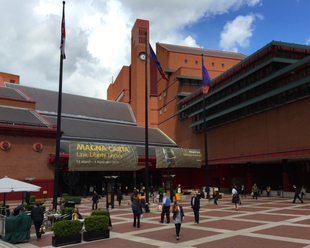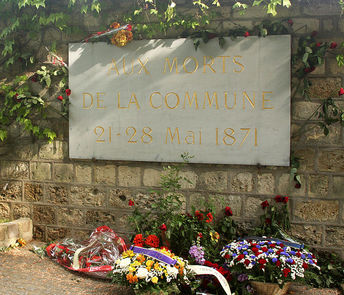 For several years I have had a copy of Magna Carta on my living room wall. An odd thing this may seem to many. It seemed a waste however to have it rolled up in a cylinder and it is a reminder to me, both of my personal history and origins and also of the continuing challenges to seek and nurture liberty. For I grew up, for most of my childhood and youth, near Lincoln, whose Cathedral owns one of the originals from 2015, now located in a permanent exhibition in Lincoln Castle. I also treasure a visit a few years ago to Runnymede, the site of the Magna Carta agreement, close by to where my sister currently lives. Above all, Magna Carta touches on so many aspects both of my historical interests and political concerns. In this 800th anniversary year of Magna Carta, it was therefore wonderful yesterday to be able to visit the Magna Carta: Law, Liberty, Legacy exhibition in the British Library. What most, pleasantly, surprised me in the exhibition were the series of historical documents, books and other artefacts from across the centuries. These were great to see, as well as refreshment to the European part of my soul which, much as I love Australia, sometimes struggles with the lack of appreciation down under of the highly diverse layers of history. Perhaps Europeans can sometimes themselves be trapped in such layers, and ignore the much more than human immensities of life, and such gifts as those of the oldest continuous civilisation on Earth, found in Australia. Yet, for me at least, to delve back into my own inheritance of history is to feel a renewed sense of intimate connection, wonder and empowerment. The Magna Carta exhibition, as its subtitle suggests, seeks to place Magna Carta in the great traditions - I would say always uncertain struggles - of law and liberty, and their legacy, particularly in Anglo-Saxon shaped countries. Lines of influence are drawn across time: including to English resistance to 17th century tyranny, 18th and 19th century radicalism, American affirmations of liberties, and 20th century declarations of rights (including by the UN and Nelson Mandela). Rather than being a legal instrument of tight principles, it is perhaps best viewed as a continually revered tool against oppression and a potent inspiration to 'maintain the rage'. Unlike other approaches, such as French and Russian, this Anglo-Saxon pathway to liberty looks not so much to radical logic or abstract ideals as to the precedents and pragmatic practices of the past, albeit often mythopoeic visions and creations out of the contexts of later times. Only three articles of Magna Carta are still UK statutes but it still has the power to shape our past and future. One remaining article is the first in Magna Carta: affirming the liberty of the English Church in the face of monarchical (or, by implication, other) domination. This reflects the work of the then Archbishop of Canterbury, Stephen Langton, a key force for reconciliation and (limited) justice in 1215. Significantly however, the then Pope disagreed, dismissing Magna Carta to the dustbin of history in his papal bull which followed. Ironically Sir Thomas More did not agree later, appealing to Magna Carta against king and for the papacy. Perhaps Christian leaders, in our own age, would do well to renew that spirit of Magna Carta, whilst seeing its insistence on liberty as something not for a special few but for all, whoever and whatever we are. The barons, like the then king and Pope, of 1215 would have been horrified to see their ideas of liberty so extended. Blind or forgetful to the inspirations and horrors of history though we may often be, we 21st century people really do not have the luxury.
0 Comments
 It is a delight to be in Europe in beautiful spring weather. It is not a very happy political 'European spring' though. All over Europe, on the brink of EU elections, uncertainty prevails and doubt is common about the 'European project' of community. For an expatriate European like myself, immersed in many historical memories, it is a troubling sight. Ironically, I am in Paris this week, speaking at UNESCO with Toowoomban friends about our 'Building a Model City of Peace and Harmony' initiative. My own particular theme is Co-operation: something from which so many Europeans seem to wish to stand back. Partly doubts about EU cooperation are understandable. The European dream seems rightly hollow to the millions who are unemployed, and to the poor and ethnic minorities struggling for recognition, for decent housing, work and living conditions. The EU can seem so distant to many, apparently overly bureaucratic and a feeble tool for more immediate concerns. Hence unhealthy right-wing parties have gained ground across the continent and even France, a founding co-pillar of the project, moves in the direction of British cynicism. How soon we forget though! This coming week (21-28 May) is 'La semaine sanglante' - or 'Bloody Week' - in Paris, the anniversary of the final episode of the Paris Commune of 1871 (see photo above: from the memorial in Pere Lachaise cemetery in paris where the last stand of the Communards was made). Recent historical examinations of death and burial records suggest that the actual week's death toll (probably around 7 000) was significantly lower than the more outrageous figures (of 20-30 000) which have long been touted, and which were used (by notable figures such as Lenin) as an example of the true barbarous heart of capitalist 'order'. Yet even such reduced figures are a staggering witness to the deeply bloody past violence of Europe, consequent on deep national, social and economic divides. The Paris Commune was a deeply ambiguous, but, historically, vitally symbolic, event. In one sense it was a magnificent act of faith and a living adventure of hope, created by some of the most wretched of people in the most wretched of circumstances. Karl Marx and others, then and since, have commended it for putting an abstract concept of freedom and justice into reality, however shortlived. Great contemporaries who lived through it, like Victor Hugo and Emile Zola, were also deeply moved by its genuine social idealism as well as shocked by its own internal violence, as well as the greater violence of its repression. What is sometimes forgotten however is that the Paris Commune arose out of the despair, anger and humiliation of the Franco-Prussian War. Indeed, the proclamation of Kaiser Wilhelm as Emperor even took place in the Hall of Mirrors in the Palace of Versailles in January 1871: a staggering affirmation of Prussian power at the heart of former French glory. Crushed by the rising, recently unified, German Empire, the Parisians refused however to accept the surrender made by their national leaders. Instead they proclaimed a new form of society in the Commune. It was thus a product of a century of such conflict and bloodshed all across Europe. Its legacy was also lasting. Among those caught up in the politics of the Commune was George Clemenceau, later so important in insisting on crippling reparations on Germany in 1918. One can but imagine the thoughts and feelings which flowed through him as he concluded the Treaty of Versailles, remembering the scenes and indignities of his youth. The outrages of the Commune's rise and fall, as an apotheosis of European divisions and violence, thus flowed right through to the second world war. The European Community project was an attempt to end it for ever. It still is. How soon we forget. The EU is hardly perfect but it requires development not destruction. Its doubters, sometimes for self-interest, are looking in the wrong direction. Recent studies continue to state the reality that social and economic division is a much more genuine and difficult challenge than any migration of peoples or cultures which they bear. In Britain, 1% of the population own as much as the poorest 55% and their wealth is increasing by 15% a year whilst others struggle. Such statistics are reflected elsewhere. Hardly any European today would wish to replicate the politics of the Paris Commune, yet perhaps its uncomfortable ideals have something to say to us, lest Europe descend further into uncooperative and unnecessary division and violence. Australia, still buoyed by comparative economic advantage, might take note too. |
AuthorJo Inkpin is an Anglican priest serving as Minister of Pitt St Uniting Church in Sydney, a trans woman, theologian & justice activist. These are some of my reflections on life, spirit, and the search for peace, justice & sustainable creation. Archives
July 2024
Categories
All
|
 RSS Feed
RSS Feed